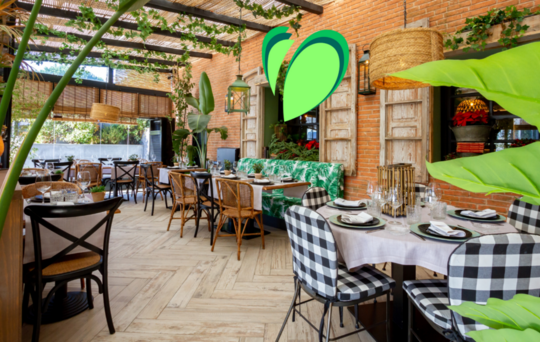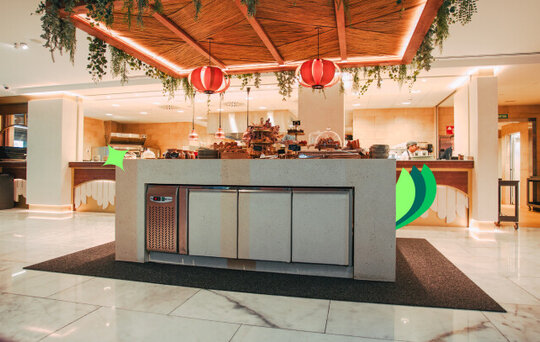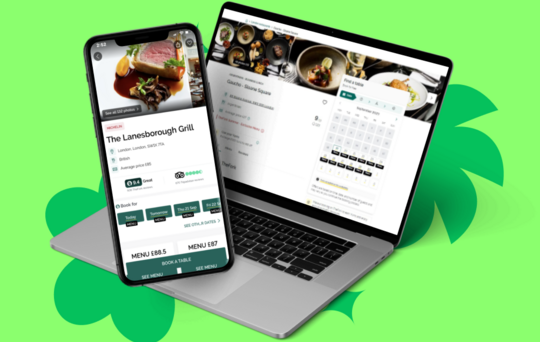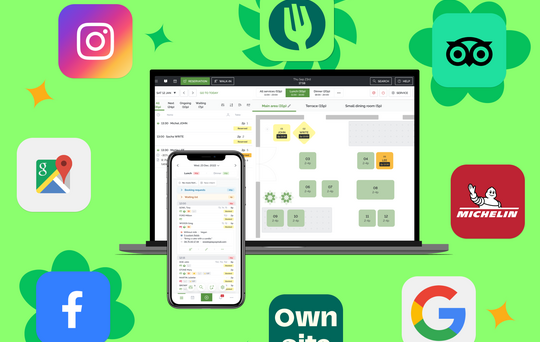Restaurant Management: The Complete Guide for UK Restaurateurs

- • What’s involved in restaurant management?
- • Would you like to reach more customers and boost your revenues?
- • Key roles and responsibilities in restaurant management
- • Staff management: hiring, training, and leading your team
- • Restaurant operations: streamlining daily tasks
- • Inventory management: controlling costs and reducing waste
- • Food safety and hygiene: essential standards
- • Financial management: from pricing to profit
- • Marketing your restaurant: attracting and retaining customers
- • TheFork Manager: simplifying restaurant management
- • Empty tables and ever-increasing costs?
As restaurant managers know, their jobs involve spinning many plates — often quite literally. The restaurant industry has become increasingly complex, and effective restaurant management can often feel like a world of its own. From navigating safety regulations to mastering ever-evolving digital marketing strategies, there's more to think about than ever before. But with the right approach, and aided by the right tools, you can build and maintain a thriving restaurant business.
So the question is; how do you manage a restaurant effectively?This comprehensive guide offers practical advice and insights for UK restaurateurs, helping to streamline operations, boost efficiency, and enhance customer satisfaction. We'll also explore how TheFork Manager, a leading restaurant booking system, can support you in achieving your goals.
What’s involved in restaurant management?
Restaurant management encompasses all the tasks and responsibilities required to run a successful restaurant. It's not just about the food; it's about creating a positive dining experience for your guests, while also ensuring the smooth and profitable operation of your business. This involves a delicate balance of "front of house" customer service, and "back of house" operational efficiency.
Key areas of restaurant management include:
- Staff management
- Customer service
- Daily operations
- Inventory management
- Food safety
- Financial management
- Marketing and promotion
Effectively balancing and mastering each area is the secret to long-term success in the industry.
Would you like to reach more customers and boost your revenues?
Key roles and responsibilities in restaurant management
While every restaurant will have a slightly different team structure, some core roles are typically found. Here's a look at the typical makeup of a restaurant team:
- Restaurant owner: Depending on the business, the owner may or may not be involved in the day-to-day operations. Their main responsibilities are to provide the restaurant's vision and finance.
- General manager: Oversees all aspects of the restaurant's operation.
- Head Chef: Responsible for menu creation and kitchen staff.
- Sous Chef: Second in command, assists the Head Chef with all kitchen tasks, and steps in when needed.
- Kitchen staff: Includes line cooks, prep cooks, and dishwashers.
- Restaurant manager: Assists with or manages restaurant operations.
- Bar manager: Responsible for bar staff, drinks menu and inventory.
- Service staff: Includes servers, hosts, bussers, and bartenders.
Staff management: hiring, training, and leading your team
Your staff are the face of your restaurant. Attracting, training and retaining a great team is therefore key. A well-managed team provides better service, leading to happier customers and increased profitability.
Hiring effectively
Look beyond just skills and experience. A positive attitude and a willingness to learn are equally important. Consider using online job boards, social media, and employee referrals to find potential candidates. During interviews, ask questions that assess not only their skills but also their teamwork, problem-solving abilities, and customer service orientation. And don't be afraid to ask candidates about their favourite local restaurants, or best-ever dining experiences.
Training your team
Invest in a comprehensive training programme that covers all aspects of the job, from food safety and hygiene to customer service and upselling techniques. Consider pairing new hires with experienced staff members for mentorship. Regular refresher training sessions are also crucial to ensure everyone stays on top of best practices.
Leading your team
Effective leadership is about clear communication, fair treatment, and creating a positive work environment. Be approachable, listen to your staff's concerns, and provide regular feedback. Recognise and reward good performance to boost morale and motivation.
Retaining your staff
Look at ways to improve staff retention. Doing so will save on training and recruitment costs, and help your team work together better. Offer competitive pay, benefits, and opportunities for advancement. A clear restaurant business plan can help with long-term staff management.
Restaurant operations: streamlining daily tasks
Efficient daily operations are the backbone of a successful restaurant. Effective restaurant operations management helps to save time, reduce errors, and improve the overall diners experience.
Reservations
Manual booking systems are prone to errors and inefficiencies. An online restaurant booking system, like TheFork Manager, simplifies the process. It allows guests to book tables 24/7 through your website, Facebook, and Instagram pages, and via a free booking widget, and it automatically updates your floor plan. This reduces no-shows through automated reminders and confirmations and frees up your staff to focus on other tasks.
You can also use the system to manage your table allocation and optimise your seating arrangements, helping you to improve your restaurant's table turnover. Why not experiment with different restaurant floor plans to see what works best?
Order processing
Digital menus and tableside ordering, often integrated with your POS (Point of Sale) system, can significantly speed up service. Orders are sent directly to the kitchen display system (KDS), reducing errors and improving communication between front-of-house and back-of-house staff. This also allows for faster order preparation and delivery, leading to increased guest satisfaction.
Customer service
Train your staff to anticipate guests' needs, handle complaints effectively, and provide personalised service. Encourage them to build rapport with guests, remember their preferences, and go the extra mile to create a memorable dining experience. Use these seven tips to welcome and anticipate customer needs to help.
Inventory management: controlling costs and reducing waste
Effective inventory management is essential for controlling food costs and minimising waste, directly impacting your restaurant's profitability. Implement a system for tracking stock levels in real-time. This could be a simple spreadsheet or dedicated inventory management software.
Set par levels for each item to ensure you always have enough on hand without overstocking. Use historical sales data and forecasts to inform your ordering decisions, further reducing the risk of wastage. Consider establishing a relationship with reliable local suppliers to ensure consistent quality and timely deliveries.
Food safety and hygiene: essential standards
Maintaining the highest standards of food safety and hygiene is non-negotiable. Failure to do so can lead to illness, fines, and reputational damage. Ensure your restaurant complies with all relevant UK food safety regulations, including the Food Standards Act 1999, the Food Safety Act 1990, and the Food Information Regulations 2014. The Food Standards Agency provides detailed guidance on these regulations.
Provide comprehensive training to all staff on proper food handling, storage, preparation, and personal hygiene practices. Regular refresher courses are vital. If your restaurant has an outdoor seating area, make sure staff training covers any special measures that apply there.
Financial management: from pricing to profit
Sound financial management is crucial for the long-term viability of your restaurant. It involves careful planning, monitoring, and control of all financial aspects of the business.
Pricing and costs
Develop a menu pricing strategy that considers food costs, labour costs, overhead expenses, and competitor pricing. Aim for a food cost percentage between 28% and 35% of the menu price, although this can vary depending on the type of restaurant. Regularly review your menu pricing and adjust it as needed to maintain profitability. Implement strategies for controlling costs, including negotiating with suppliers, reducing waste, and optimising staff scheduling.
Budgeting and reporting
Create a detailed budget that outlines your projected income and expenses. Track your actual performance against the budget regularly and identify any areas where you're overspending or underperforming. Use financial reports (profit and loss statements, balance sheets, cash flow statements) to monitor the financial health of your restaurant. With a tool like TheFork Manager, many of these reports can be generated automatically.
Marketing your restaurant: attracting and retaining customers
Effective marketing is essential for attracting new guests and keeping existing ones coming back. A multi-channel approach is usually the most effective.
Social media and email
Build a strong online presence through social media platforms like Instagram and Facebook. Share high-quality photos of your food, your restaurant, and your staff. Run targeted advertising campaigns to reach potential customers in your area. Use email marketing to keep in touch with your guests, promote special offers, and announce events. TheFork Manager can provide support with your social media marketing.
Online listings and reviews
Make sure your restaurant is listed on relevant online platforms like TheFork, Google, and TripAdvisor (take a look at this free guide about restaurant reservation platforms). Encourage satisfied guests to leave positive reviews, as these can significantly influence potential diners. Respond to reviews, both positive and negative, in a professional and timely manner.
Local partnerships and loyalty programmes
Collaborate with other local businesses (hotels, shops, theatres) to cross-promote your services. Offer special deals or discounts to theirguests, and vice versa. Consider launching a loyalty program to reward repeat guests and encourage them to dine with you more often. Consider joining a well-structured loyalty programme like Yums from TheFork. You might also consider adding a takeaway service to increase revenue.
TheFork Manager: simplifying restaurant management
TheFork Manager is a comprehensive restaurant booking system designed to help you streamline operations, increase efficiency, and boost revenue. It offers a range of features that address many of the challenges discussed in this guide, all in a centralised, user-friendly platform.
Key benefits:
- Online reservations: Accept bookings 24/7 through multiple channels, including a free booking widget for your website.
- Table management: Optimise your floor plan and seating arrangements, helping you to increase table turnover.
- Customer database: Build a database of guests' information and preferences.
- Automated communications: Send booking confirmations, reminders, and promotional offers.
- Reporting and analytics: Track key performance indicators (KPIs) to make data-driven decisions.
By simplifying many of the time-consuming and complex tasks associated with restaurant management, TheFork Manager frees you up to focus on what matters most: providing an exceptional dining experience for your guests.
Explore TheFork Manager's features in more detail, and discover how they could benefit your restaurant.
Empty tables and ever-increasing costs?
- What’s involved in restaurant management?
- Would you like to reach more customers and boost your revenues?
- Key roles and responsibilities in restaurant management
- Staff management: hiring, training, and leading your team
- Restaurant operations: streamlining daily tasks
- Inventory management: controlling costs and reducing waste
- Food safety and hygiene: essential standards
- Financial management: from pricing to profit
- Marketing your restaurant: attracting and retaining customers
- TheFork Manager: simplifying restaurant management
- Empty tables and ever-increasing costs?













